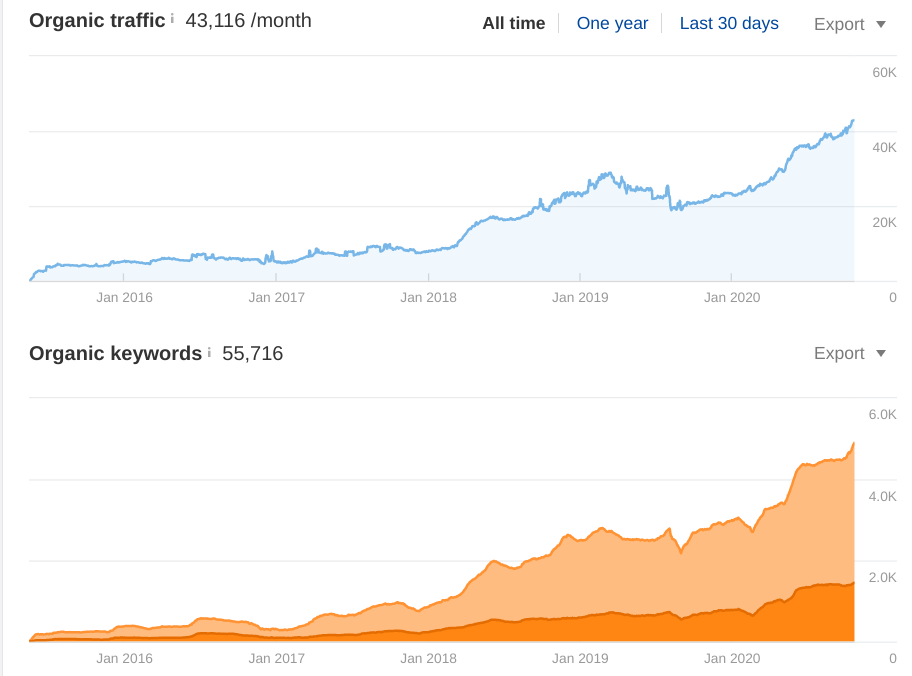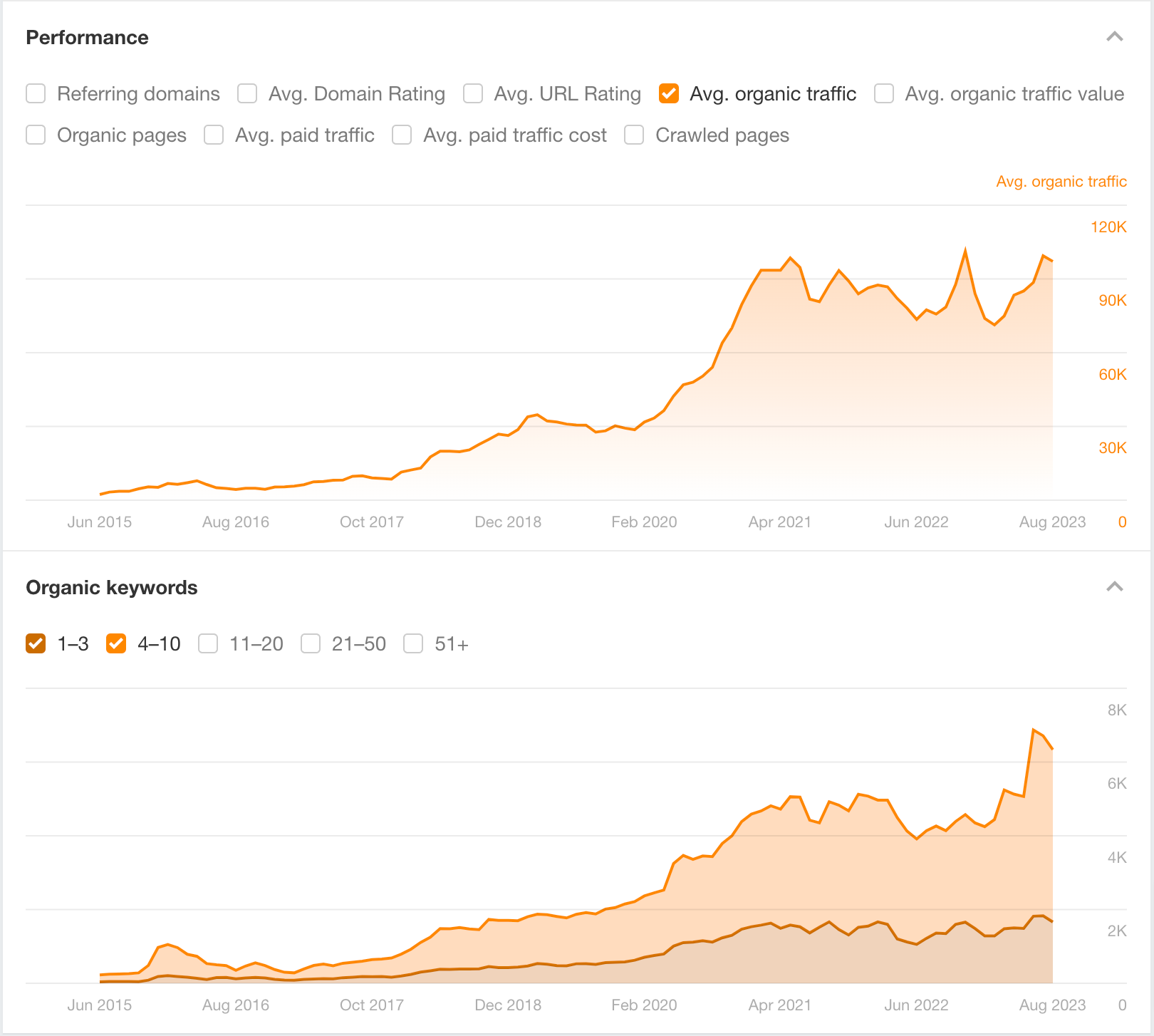As you likely already sensed from the title, this might get a little controversial but…
Content marketing projects have completely burned some people. At the same time, others have seen downright incredible success from effectively wielding their content.
Speaking as a content marketing agency, the debate over whether or not content marketing works is one of the top objections we hear. And listen, we get it; nobody likes paying for products that don’t work.
But we also know for certain that content marketing does work. At Brafton, our traffic doubles every year from content alone.



So why does content marketing peter out for some companies, while it sends others flying off the charts? And more importantly, how can you leverage it to boost your brand?
To understand all this, let’s first go over the top 3 reasons why content marketing fails for some people:
Reason 1: They Didn’t Execute Properly
Take it from the pros: Content marketing isn’t easy to do right.
As a matter of fact, only a small portion of content generates any results at all. For an easy example, just try scrolling through any social media feed for a few minutes. You’ll undoubtedly see dozens of sponsored posts with minimal engagement.
But why does this happen?
Content marketing only works if it’s data-led. The actual content should only be around 10% of the work. The other 90% of your time should be spent on:
- Keyword research (50%).
- Search engine results page (SERP) inspection (10%).
- Subtopic research (15%).
- Content briefing (15%).
Without doing this up-front, strategic work, you’re simply writing for the sake of it. Unfortunately, it’s all too easy for this type of content to get mixed up with all the other noise that’s out there.
Reason 2: They Don’t Have the Right Expectations
Some people assume that leveraging content marketing will automatically generate leads for their business. To be frank, that’s like buying a pair of running shoes and expecting to get absolutely shredded.
Getting the results you want (and need) is going to require thoughtful effort and commitment on your part — there’s no way around it. And with content marketing, the results completely depend on the types of content you’re creating.
When it comes to lead-generating content, check out what drives 99% of our leads:
❌ Blogs = No leads.
❌ Infographics = No leads.
❌ Social media = No leads.
❌ Video = No leads.
✅ Commercial landing pages = Mostly leads.
✅ Email marketing = Mostly leads.
As you can see, it’s crucial to understand what each piece of content does and how to use it before you can set expectations around results. Put another way: You shouldn’t expect blogs to generate leads, just like you wouldn’t expect that simply owning running shoes would grant you incredible upper body strength.
Reason 3: They Don’t Know How Long It Should Take
Finally, one major problem that both clients and content creators face is understanding the time frame. Clients want to know: When will the content marketing strategy they’ve invested in start working and provide results?
This is a great question, but unfortunately, many content experts have no idea what day or time period their campaign will really begin to thrive.
To find the true answer and determine a standard “waiting period”, we ran an extensive SEO study that was published on Moz.
The answer? Content marketing takes between 100-150 days to start working.
More specifically, we found that 90% of all new content takes a minimum of 100 days to generate results. So it’s pretty easy to see why some people would think content marketing doesn’t work. It requires a ton of skill, the right expectations and a lot of patience.
But what can marketers do to truly make a content strategy work for them?
Subscribe to
The Content Marketer
Get weekly insights, advice and opinions about all things digital marketing.
Thank you for subscribing to The Content Marketer!
7 Steps to Make Content Marketing Work For You
Here are the 7 steps to successful content marketing:
1. Focus Your Strategy
Instead of churning out content to see what sticks, craft a thorough plan that not only aligns with your goals but also with your audience’s needs and wants. Start by identifying who your target audience is and discovering what’s relevant to them. Then, you can move on to…
2. Establish Clear Goals and Metrics
As you craft your content strategy, it’s crucial to define what success will look like and how to measure it. Set specific, measurable KPIs, such as increasing web traffic by X percentage or generating X number of leads. This will help you track success and refine your strategy along the way.
3. Leverage Data-Driven Insights
Use keyword research and data analytics to better understand your target audience’s preferences, pain points and behavior. Tools like Google Analytics are great for helping you track critical KPIs and identify patterns. These insights take the guesswork out of your content marketing strategy.
4. Diversify Your Content Formats
Don’t be afraid to experiment with various content formats for different purposes. Videos and infographics are excellent ways to capture audience attention with flashy visuals, but a podcast could be a fun way to bolster your brand authority while appealing to different consumer preferences.
5. Emphasize Quality Over Quantity
Each day, brands and bloggers publish millions of articles on the internet. Audiences have plenty of blogs to choose from, so make sure yours cuts through the noise with its quality. Emphasize high-quality, valuable content with substance that resonates with your audience and positions your brand as a trusted source of information.
6. Be Consistent (and Patient)
While quality over quantity is critical, you can’t expect to drop one white paper a year and maintain an audience. Recognize that content marketing requires persistence, long-term effort and commitment. Try building out a content schedule to ensure consistency and maintain anticipation with your audience.
7. Make Continuous Improvements
Lastly, it’s crucial to review and regularly assess your content’s performance and your strategy’s efficacy. Analyze the data to see what’s working and what could use improvement, then use these insights to adapt.
Remember, success in content marketing isn’t guaranteed, but with a well-defined plan, consistent effort and optimization (and enough time), you can leverage content to elevate your brand and drive meaningful results.





